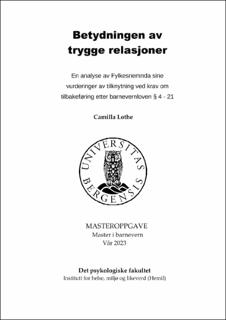Betydningen av trygge relasjoner - En analyse av Fylkesnemnda sine vurderinger av tilknytning ved krav om tilbakeføring etter barnevernloven § 4 - 21
Master thesis
Permanent lenke
https://hdl.handle.net/11250/3069684Utgivelsesdato
2023-05-15Metadata
Vis full innførselSamlinger
- Master theses [165]
Sammendrag
Barn har rett til å vokse opp med sine foreldre, og skal ikke skilles fra disse, med mindre det er til barnets beste (Barnekonvensjonen, 1989). Dersom offentlige myndigheter overtar omsorgen for ett barn, er hovedregelen at dette skal være midlertidig, og at barnet skal flytte hjem til sine biologiske foreldre så snart dette er forsvarlig (Barnevernloven, 1992). Studien undersøker hvilke vurderinger Fylkesnemnda gjør med tanke på barnets tilknytning når de skal avgjøre om barnet skal flytte hjem eller ikke. Formålet er å finne ut mer om hvordan Fylkesnemnda vurderer barnets tilknytning til biologiske foreldrene, barnets tilknytning til fosterforeldrene, samt formålet med samvær. Studien er en kvalitativ dokumentanalyse. Datamaterialet jeg har brukt er vedtak fra Fylkesnemnda, fattet etter barnevernloven § 4 – 21, som omhandler krav om tilbakeføring etter en omsorgsovertakelse. Vedtakene er hentet fra nettstedet Lovdata Pro. Utvalget består av 32 vedtak fra 2021 og 2022. Funnene drøftes i lys av tilknytningsteori. Funnene viser at Fylkesnemnda er opptatt av den emosjonelle omsorgen barnet trenger for å utvikle en trygg tilknytning til sine omsorgspersoner. Det er tydelig at det er barnets tilknytning og behov for god, emosjonell omsorg, ikke biologi, som er avgjørende for Fylkesnemnda sin vurdering. Tilknytning til biologiske foreldre blir ofte vurdert som svak eller utrygg, og manglende omsorg fra foreldrene er årsak til barnas emosjonelle vansker. Det blir understreket at samvær skal bidra til å skape/styrke relasjonen mellom barn og biologiske foreldre. Children have the right to grow up with their parents, and shall not be separated from these, unless it is for the childs best (Convention on the Rights of the Child, 1989). If the authorities takes over the care for a child, the mainrule is that this is temporary, and the child shall move back to the parents as soon as possible (Child Welfare Act, 1992). This study investigates which assessments the Norwegian County Board for Child Welfare and Social Affairs does regarding the childs attachement when they are determining whether a child is moving back home or not. The purpose is to find out more about how the Norwegian County Board consider the childs attachment to the biological family and the fosterparents. The methodical approach for this study is qualitative document analysis. The data I have used is a selection of decisions made by the Norwegian County Board. The selection contains of 32 documents from 2021 and 2022, retrieved from the website Lovdata Pro. The findings shows that the Norwegian County Board are concerned with the emotional care children need so they can develop a safe attachment to their caregivers. The childs attachment to biological parents are often described as week or unsafe, and the lack of emotional care from the parents are the cause of the childrens emotional difficulties. It is underlined that contact should contribute to create/strengthen the relation between the child and the biological parents.
